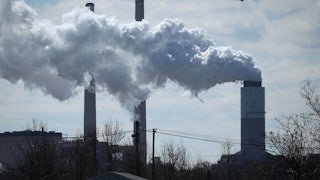On the one hand, the Supreme Court has opened the door to the destruction of the administrative state and limited the Environmental Protection Agency’s ability to regulate power sector emissions. On the other hand, a lot of other bad stuff happened recently too. While many eyes in the United States were mainly fixed on Supreme Court rulings over the last two weeks—planning for a future for reproductive rights without Roe v. Wade, awaiting West Virginia v. EPA, and preparing for a series of other disastrous decisions—it was easy to miss a string of awful news for the climate at home and abroad.
Here’s a guide to what happened. After putting up barriers to desperately needed climate finance at the U.N. climate talks last fall, leaders of the world’s richest countries—the “Group of Seven,” or G7—convened in Germany and collectively agreed to walk back a batch of previously made climate commitments. Having earlier pledged to end overseas financing for fossil fuels by the end of the year, they gave themselves a loophole to continue such financing “in limited circumstances clearly defined by each country consistent with a 1.5C warming limit.” (The International Energy Agency found last year that no new fossil fuel development is consistent with keeping warming below 1.5 degrees Celsius, or 2.7 degrees Fahrenheit.) New gas infrastructure, leaders wrote in a final communiqué, is a “necessary response to the current crisis” and a good candidate for “publicly-supported investment” as a “temporary response.” They also watered down a previous commitment to make half of all vehicles they produce zero-emission by 2030, promising instead to increase sales of electric vehicles “significantly.” This is all dispiriting, though it fits with the G7’s miserable track record of following through on its climate pledges.
Speaking of pledges, one of the higher-profile announcements made at the COP 26 climate summit in Glasgow late last year—the Global Methane Pledge, signed by 110 countries—doesn’t seem to have made much of a dent. The satellite firm Kayrros reported this week that methane emissions have outpaced the rebound in coal, oil, and gas drilling. Just in the Permian Basin—the U.S. shale patch where leaders of both parties are eager to juice production—methane emissions in the first quarter of 2022 climbed by 33 percent over the previous quarter, up 47 percent over the same period last year. Researchers suggested it could be due to the rapid uptick of drilling there that policymakers are keen to continue. The number of so-called “super”-emitting methane leak sites is back up to pre-pandemic levels and is on track to nearly double this year. Nearly 60 percent of those sites are in the Permian Basin.
One of the nation’s top oil- and gas-producing states, California, is delaying the closure of gas plants to cope with a potential energy crunch this summer. The Biden administration is reportedly debating whether it should ban or expand offshore drilling as it frets over how to bring down gas prices. Expanding drilling would renege on one of the lower-hanging fruits of Biden’s campaign pledge, which may not sit well with the 61 percent of eligible voters under 34 who already disapprove of Biden’s job performance.
Back in Europe, years of talks to update the Energy Charter Treaty, or ECT—an investment treaty that gives energy companies the right to sue sovereign governments—ended with a thud. The European Union and the U.K. agreed that fossil fuel investors would retain their right to sue governments for the next 10 years after the revamped treaty goes into effect, which is expected to happen this November pending legal review and three-quarter ratification from signatories. That means fossil fuel companies (or even individual investors) can continue seeking compensation for losses over, say, a coal phaseout, until 2032. Spain—which has faced multiple suits under the treaty—is urging the EU to withdraw, arguing the pact will “fail to ensure the alignment of the ECT with the Paris Agreement and the objectives of the European Green Deal.” A coordinated withdrawal from the treaty, researchers found recently, could reduce the cost of supply-side climate action by between $5 and $20 million, depending on the price of oil.
If you’re tempted to see the private sector as keen to lead the way as governments flounder, there’s bad news on that front too. Despite the rash of net-zero commitments that have cropped up over the last year, publicly listed companies are on track to continue warming the world by nearly 3 degrees Celsius, according to the equity index compiler MSCI. Just 11 percent of them are on track to reduce emissions in ways consistent with keeping warming below 1.5 degrees Celsius.
Half a dozen countries in Europe and Asia experienced record-breaking heat waves in June, as did several states in the U.S. Happy July!






